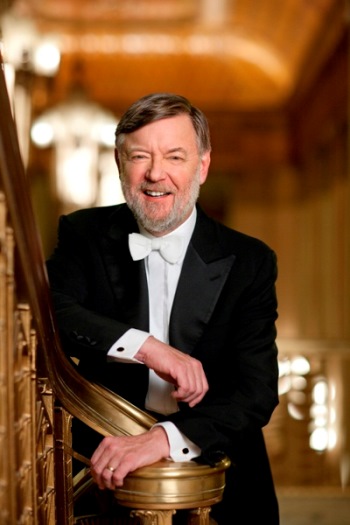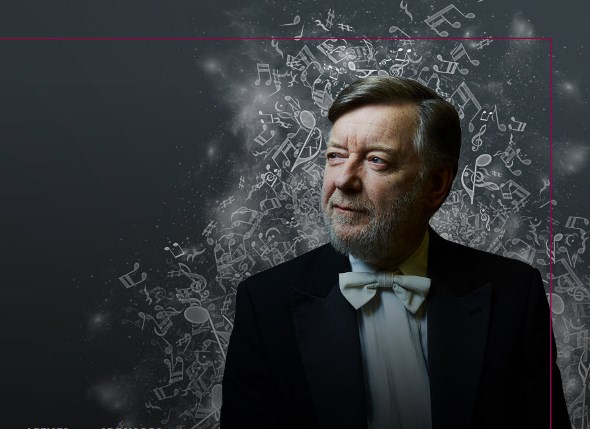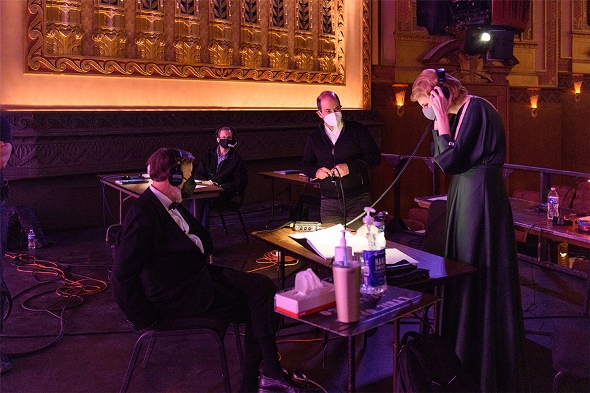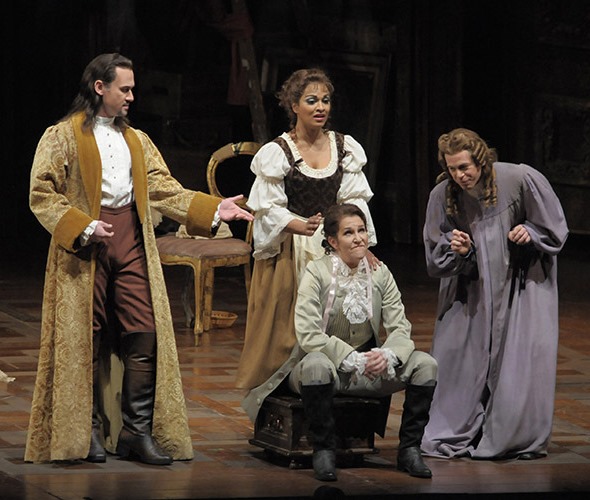As Lyric Opera bids farewell to Andrew Davis, the maestro puts down his baton for a trowel
Interview: Lyric’s music director will conduct his own streamed exit concert – and shift his energy to gardening and translating Virgil.
By Lawrence B. Johnson
It was to be called “A Knight to Remember,” not that anyone who came into contact with Lyric Opera of Chicago over the last two decades was very likely to forget Sir Andrew Davis. He has served as the company’s music director for 20 years, and this spring he was to have been honored with a grand tribute concert at the opera house – Ave atque vale, as it were – as he ceded the reins to his successor, Enrique Mazzola.
 Then the pandemic came crashing down, and Davis’ big night got blown away along with, oh my, a boggling bunch of other crowning projects – first and most dismaying among them three complete turns through Wagner’s gigantic “Ring” tetralogy. But not incidentally, when the entire 2020-21 season was canceled, Davis also lost the opportunity to conduct two operas especially close to his heart, Mozart’s “The Marriage of Figaro” and Stravinsky’s “The Rake’s Progress.”
Then the pandemic came crashing down, and Davis’ big night got blown away along with, oh my, a boggling bunch of other crowning projects – first and most dismaying among them three complete turns through Wagner’s gigantic “Ring” tetralogy. But not incidentally, when the entire 2020-21 season was canceled, Davis also lost the opportunity to conduct two operas especially close to his heart, Mozart’s “The Marriage of Figaro” and Stravinsky’s “The Rake’s Progress.”
Thus, under the pandemic’s abiding if perhaps fading shadow, Lyric Opera has fashioned a virtual salute with some very fine singers as well as its chorus, an ambitious video made under Davis’ baton. And the music on tap is none other than highlights from “The Marriage of Figaro” and “The Rake’s Progress.” Davis sees this streamed farewell as a happy solution in what has been a dreadful stretch for everyone. The program was recorded in March.
“They wanted to do something to mark the occasion, so I thought why not excerpts from two of my favorite operas – operas I had expected to conduct at the very end of my time here,” Davis said. “‘Figaro’ was the opera I conducted the first time I came to the Lyric back in 1987. I thought I would find some satisfaction in doing at least parts of ‘Figaro’ and ‘Rake’s Progress.’ We certainly have wonderful singers.”
That lineup of Lyric veterans includes sopranos Amanda Majeski and Janai Brugger, mezzo-soprano Kayleigh Decker, tenor Matthew Polenzani and bass-baritone Kyle Ketelsen. The Lyric Opera Chorus was conducted via Zoom from the singers’ homes by Michael Black, and their performance was then overlaid on the orchestra track. At least Davis had the orchestra and solo voices on stage, albeit distanced from one another.
“I had to get binoculars to see the bassoons and clarinets,” Davis said with a laugh and a sigh. “I think all the distancing may have kept tempos a bit on the slow side, just trying to keep everything together, but we managed.”
While Davis speaks warmly and affectionately of his long run with Lyric, he also admits the pandemic-induced crash that ended his tenure has been a painful episode. On the run-up to the canceled “Ring” cycles, he had conducted Wagner’s first three operas of the tetralogy –”Das Rheingold,” “Die Walküre” and “Siegfried” in consecutive seasons and was well into rehearsals for the grand finale, “Götterdämmerung,” when Lyric general director Anthony Freud informed him that the curtain had fallen. The three complete “Ring” cycles, just weeks away, had succumbed to the raging virus.
“It was a great tragedy, losing the ‘Ring,’ Davis said. “It had been a great journey, getting the production team together, deciding on the look. I loved the whole design thing of being able to see the apparatus of the theater from the audience. And the concept was all about the characters, not the set. And just like that, it was all gone.
“But still, these last 20 years have been a wonderful period of my life. I was able to do a complete ‘Ring’ cycle in 2005 – that was the carrot that got me to come to Lyric in the first place. And there have been other special things – (Berg’s) ‘Wozzeck,’ but especially (Berg’s unfinished) ‘Lulu,’ which I’ve been enamored of since I was 18. And Janáček, both ‘Jenůfa’ and ‘The Cunning Little Vixen.’ Puccini, too. I’d never done any Puccini before coming here, and I think we did most of his operas. Great music. I don’t think ‘Bohème’ has a spare note in it.”
Davis rattled off other composers whose operas stick with him in fond Lyric memories: Massenet, Britten, Tippett, the world premiere of Jimmy López’s “Bel Canto.” In 20 seasons, Davis plowed a lot of opera ground. And next, post-Lyric?
“Much less,” said the 77-year-old conductor. “Opera is time-consuming, and I want to spend a lot of time not conducting. I’m sure I’ll be back to conduct at Lyric, but I’m not doing any opera anywhere else. I’ll visit the Toronto Symphony, my first band, and Melbourne (where he was also music director), but guest appearances with orchestras are different from the commitment of opera. I have other things I want to do. My wife and I bought a house in the mountains of North Carolina on a lake last March. I want to do some gardening.”
That and polish off a little project of his pandemic idleness: a verse translation into English of Virgil’s Latin epic “The Aeneid,” a tale of the founding of Rome.
“In high school, I studied Latin and Greek,” the English-born conductor allowed with a small chuckle. ”The Aeneid’ consists of 12 books – 9,896 lines. I’ve completed 11 books, translating into iambic pentameter. It’s been very rewarding, and not totally unlike when I usually do, only looking for color in words instead of sound, to capture the emotional climaxes, the power and the grandeur. Virgil’s work was commissioned by Augustus to celebrate Rome’s history, but there are parts where Virgil is quite sarcastic about that.
“Anyway, that’s what I started doing a year ago, my retirement project. It’s huge, and not something you can rush.”
One can only repeat: Ave atque vale. Hail, Maestro, and farewell.





